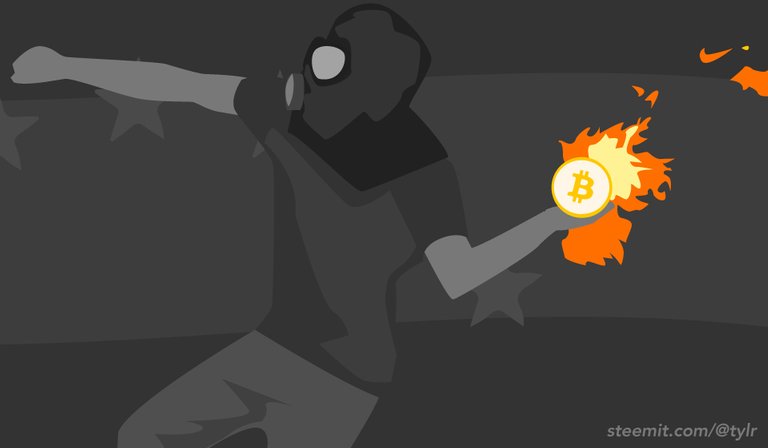
Last post, I used international trade to valuate the Bitcoin. The original intent of my next post was simply to imagine the world’s failing currencies replaced by crypto and determine what amount of value the Bitcoin would hold as a result.
But during research, I decided that topic, while interesting in its own rite, encroaches on one of the most fascinating financial stories of our time. A story that should be explored. And a future that begs to be imagined.
Venezuela is an important piece of the the story of the Bitcoin
Venezuela which, for reasons listed below, is a tremendous bridge between my two topics (international trade and failing world currencies) and could be a significant foothold in the steady climb to dominance that the Bitcoin is making.
Why?
First off, the genesis of the financial crisis in Venezuela is simple to understand: nearly all of Venezuela’s economy is based on oil exports. So the value generated annually by the Venezuelan GDP has gone from $400B to $250B in the last 5 years. This has left Venezuelans (who produce little else than oil) unable to trade for goods they need. The central bank, motivated to suck the last remaining life from the currency, has printed bolivars to the point of hyperinflation.
Liberty Foothold in Bureaucratic Inefficiency
But get this: because Venezuelans, who are currently struggling to afford just about every necessity, have (due to drilling and subsidies) nearly free energy. (Given that you’re a reader on steemit I’m assuming that you’re fully aware what the Bitcoin and cryptocurrencies are and that energy cost is the main limitation keeping most folks from mining their own BTC.)
So Venezuelans are mining the Bitcoin and other cryptos
Please stop and think of the brilliance of this solution for a minute: Venezuela, a nation filled with oil reserves, who enjoyed a brief era of high oil prices has now found itself setting modern records in all of the hallmarks of sociopolitical upheaval brought on by a drop in the price of oil. Enter the revolutionary Bitcoin mining industry; the world’s most efficient means to convert inexpensive energy almost directly into money. It’s a perfect hedge for a country that for so long had just one export. As the price of oil goes up, Venezuelans sell more oil. As the price goes down, Venezuelans sell less oil and use their inexpensive energy to secure the Bitcoin network.
It’s the free market in action. (Free markets exist everywhere, but some free markets are black markets.)
Which is why the Venezuelan government has audaciously worked to stop the practice. Instead of recognizing the opportunity and supporting the effort--a move that could result in the emergence of Venezuela as a major player in the industry--the police there have raided mining ops, confiscated rigs, syphoned off bribes, and arrested miners.
Maybe they don’t like the idea of Venezuelans wasting energy on magic internet money. Also maybe they are concerned that an industry capable of producing wealth will eventually wean off the military’s lucrative supplies distribution syndicate.
Maybe they are concerned that Venezuelans (who already have moved a dramatic amount of transactions online) will stop trading near worthless bolivars and start adopting BTC as the most widely accepted currency.
The First Future Economy?
So is a small chunk of the $3.6B worth of the annually mined BTC going to have a big impact on the GDP of Venezuela? Meh. But sometimes value is in the eye of the behodler. Right? What really matters is that Venezuela has a power vacuum and a congruent currency vacuum. Nations with economic stability have to anticipate waiting years or decades to see a cryptocurrency rival their respective fiats. But cryptocurrencies are better than the bolivar now.
Money as Liberty
(I can hope, but I cannot predict.) If this occurs, it will represent the release of the Venezuelan government’s corruption-stranglehold on its people. The Bitcoin is permissionless, a paradigm that even the most freedom loving nations are struggling to understand. This would represent so many important changes to the way their economy (or any economy) works that to imagine such requires a whole different blog post (noted).
But one certain change is a power flippening: officials leveraging the control of the flow of supplies and the manipulation of prices would no longer have the opportunity to fatten their coffers at the expense of the health of the nation. As evidenced by the impressive demonstrations in the streets, Venezuela possesses a vigorous population that, given the relief from oppression, will quickly leverage the abundant natural resources into a thriving economy.
And all it would take is for them to trade with the right kind of money
Which brings me back to the original intent of the post: if Venezuela were to adopt a cryptocurrency for normal commerce, what would that currency be worth? And in my very next post, that’s exactly what I’m going to tackle.
Thanks for reading. Here are a few of the links I used to do my research for this post.
- https://en.wikipedia.org/wiki/Velocity_of_money
- https://www.bloomberg.com/news/articles/2017-05-31/venezuela-central-bank-devalues-currency-64-on-new-fx-exchange
- https://www.dicom.gob.ve/
- https://www.theatlantic.com/magazine/archive/2017/09/big-in-venezuela/534177/
- https://www.washingtonpost.com/news/worldviews/wp/2017/03/10/bitcoin-mining-is-big-business-in-venezuela-but-the-government-wants-to-shut-it-down/?utm_term=.bf6b1678c755
- http://www.insightcrime.org/news-briefs/350-billion-lost-to-corruption-venezuela-official
I’m Tyler (steemit.com/@tylr). I’m a husband and a father (of 7) working full time as a firefighter paramedic and I’m a part time graphic designer, web designer, pig farmer, crypto speculator, and writer. I love Jesus (if not religion), liberty (to a fault), education (if not the education system), big families (esp. mine), good food (and coffee), fascinating discussions (productive or not), and adventure (in strange forms). I’m writing this blog because I feel that I have a great deal of interesting things to talk about. I’ve waiting longer than I should have because I’ve been concerned writing about so many topics would not work (we will see whether or not I was wrong). If any of these topics are interesting to you, please follow my blog and feel free to make requests. Thanks for reading.